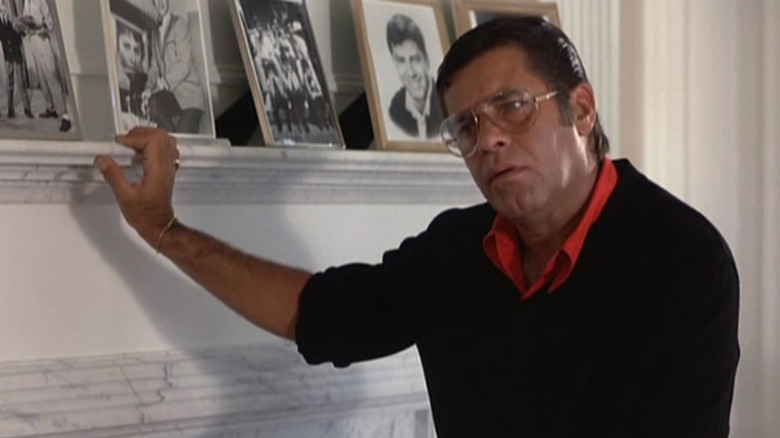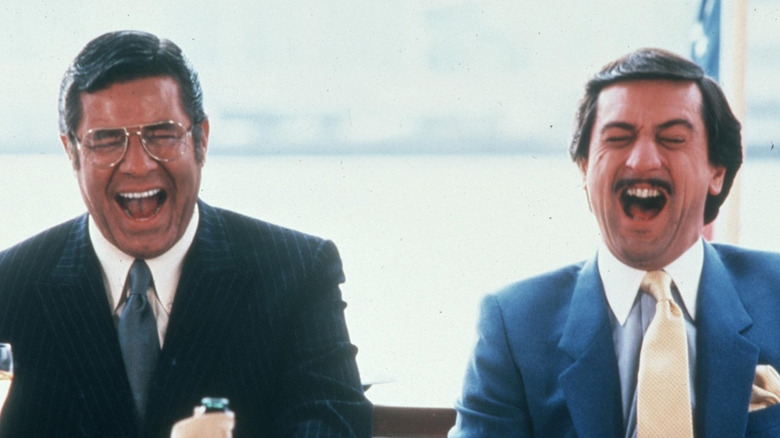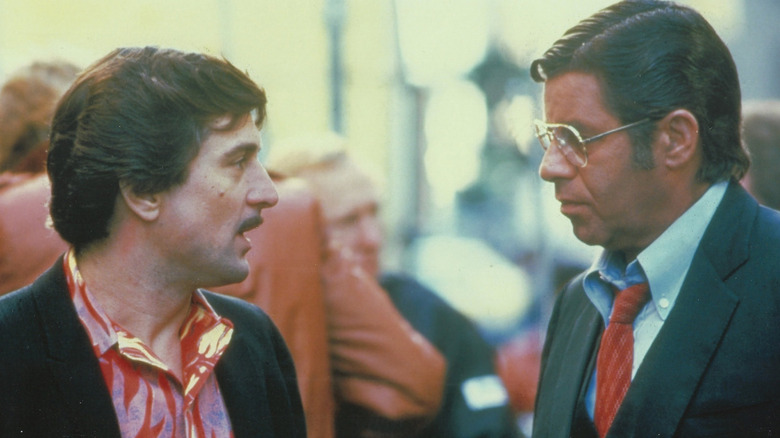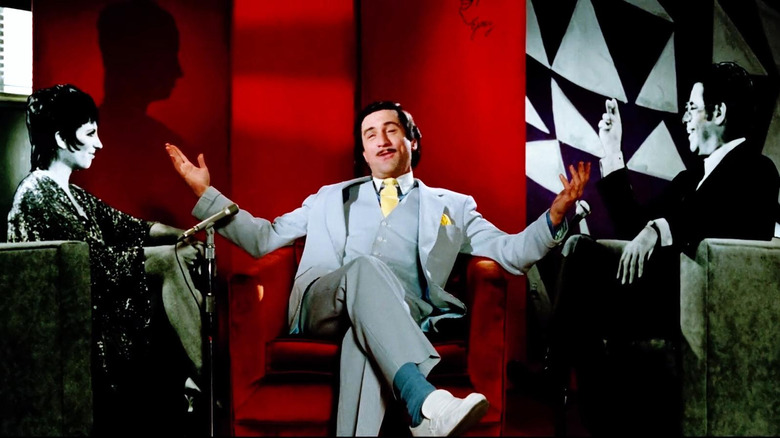Jerry Lewis Taught Martin Scorsese An Important Lesson On The Set Of The King Of Comedy
Back in the early '80s, "The King of Comedy" saw Martin Scorsese follow up "Raging Bull" with a black comedy like no other.
Walking a fine line between "Taxi Driver" and an episode of "The Tonight Show," it's the tale of a dangerous loner who wants nothing more than to be noticed. If that sounds familiar, it's because "The King of Comedy" heavily inspired "Joker," with its star Robert De Niro even switching roles to play the late-night talk show host in the 2020 DC film.
But in the original, it was Jerry Lewis who took that role.
"The King of Comedy" follows Rupert Pupkin (De Niro) — a delusional, down-on-his-luck, aspiring comedian who becomes obsessed with late-night talk show host, Jerry Langford (Lewis). "It was a world in which professionals such as Jack Paar and Johnny Carson and regular guests like Don Rickles and Jerry used all of their performing skills, the sense of timing and rhythm that they'd honed throughout the years to the finest point, to create a feeling of relaxation and intimacy with their audiences," said Scorsese.
Convinced that he's due his big break, Pupkin hounds Langford with requests for a shot on his show ... until the rejections finally get the better of him and Pupkin kidnaps his idol. As Scorsese said:
"We were looking at the other side of the equation, namely the people in the audience who took the intimacy literally, and the very thin line between love and hatred that could develop when they learned that it was all just a beautiful illusion."
And in the process, it looks as though Scorsese himself learned a valuable lesson.
'You're as human as the rest of us, if not more so.'
It's no secret that Jonny Carson was originally tapped to play the role of Jerry Langford, but the iconic late-night talk show host didn't think he was up to the task. "You know that one take is enough for me," he told Scorsese upon rejecting the role.
Instead, Scorsese turned to the Rat Pack, briefly considering Frank Sinatra and Dean Martin for the role before landing on the inimitable Jerry Lewis."By that time, he had become a legend in movies and on the late-night television talk show circuit, which was a world unto itself — one that I loved and that I was paying homage to in the picture," Scorsese said.
Lewis was a late-night mainstay when he was cast in "The King of Comedy," guesting on a huge variety of shows and even making an appearance on "Late Night with David Letterman" by 1982. But the role of Jerry Langford wasn't easy for Lewis. Scorsese described the situation:
"Jerry Langford was an uncomfortable role for him to play, because he was skirting the edges of his own life in absolutely every scene. Sometimes it went beyond that: he was wearing his own clothes, he was playing scenes where he was often expressing his own feelings about showbusiness and celebrity, and at times you didn't know if you were seeing Jerry Langford or Jerry Lewis."
Much like Pupkin blurred the lines between fantasy and reality, it seems that Lewis blurred the lines between Langford and his own experience. There was even one scene that came directly from Lewis' own memories. "I remember Jerry telling us many stories about his own experiences, one of which we incorporated into the picture," said Scorsese. That scene was when Langford is approached by an old lady for an autograph. But when Langford politely declines, she screams at him: "You should only get cancer."
But still, Lewis remained a consummate professional.
'I'm really good, Jerry, believe me, I'm dynamite.'
"The King of Comedy" turned out to be a straight-up classic, even if it didn't ignite the box office. And a lot of that success is due to Jerry Lewis.
"It was a remarkable and moving experience to watch him at work, improvising with Bob De Niro and the other actors and with his old friend Freddie de Cordova," said Scorsese. "I felt like I was watching a virtuoso pianist at the keyboard. And he knew his way around live television so well that I asked him to direct some of the actual on-air sequences for The Jerry Langford Show."
This certainly goes some way to explaining why the late-night world of "The King of Comedy" feels so authentic. The glamor of both Lewis and "The Jerry Langford Show" is totally believable as a real-life talk show and its host. But it wasn't just the movie he affected — he influenced Scorsese, too:
"I started out in movies in the late 60s, working independently, and I initially thought of making movies as something that you did with friends, the people you always knew were going to be there no matter what — that was the spirit I'd grown accustomed to. I'd made some big-scale pictures and I'd worked with many actors and artists you could call 'professional', but I still felt like I didn't belong to the world of Hollywood moviemaking."
Scorsese was accustomed to making films with his friends — evident by the fact that this was his fifth collaboration with De Niro. But Lewis helped him step into a more professional role.
'Better to be king for a night than schmuck for a lifetime!'
By the time "The King of Comedy" began filming, its two stars were both household names. However, Lewis assured Scorsese that there would be no clash of egos.
"When we started The King of Comedy, we were shooting at night, which is always difficult, and we were finding our way in," said Scorsese. "And there were delays. We had scheduled Jerry to come in, but then we hadn't reached his scenes, so he was basically sitting in his trailer and waiting for us to be ready for him."
Scorsese has since praised Lewis' performance in the film ... but also revealed that he changed the way the filmmaker approached filming:
"On the third night, he asked to see me in his trailer. I sat down, he looked me in the eye, and he spoke very quietly but firmly. 'Look, I'm a professional,' he said. 'So, when you tell me to be here at 9pm, I'm going to be here. You're paying for my time. All I ask is if you find that by two o'clock in the morning you're not going to need me, just let me know.' I already had a great deal of respect for Jerry, but at that moment it deepened. It was a moment of clarity for me, because it helped me to realise that you could work with people who weren't friends, people who came from different worlds who perceived the work differently. Jerry taught me that being a professional was a serious matter."
As far as professionalism goes, "The King of Comedy" is a masterclass from both Lewis and De Niro, capturing the dark reality of the underdog story that's so popular in American pop culture. Ironically, the film itself didn't do as well as the studio hoped. "The King of Comedy" premiered at the Cannes Film Festival in 1983 and went on to critical acclaim despite failing to earn back its budget.
Now, the film is considered a Scorsese classic alongside some of his best movies. Rupert Pupkin would be proud.



